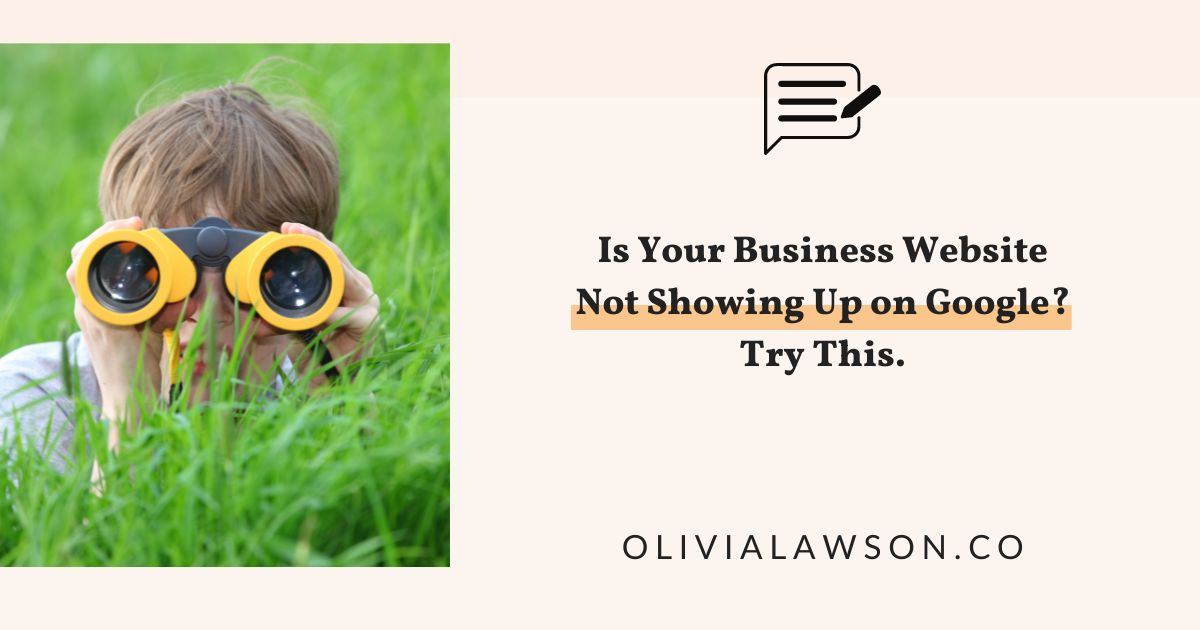
Picture this: You’ve just launched your business website, filled it with great content, and eagerly await a surge of visitors. But days turn into weeks, and your site seems to be wearing an invisibility cloak.
You head over to Google, type in your business name and nothing.
In this blog post, we’ll talk about how to get found on Google and some simple things you can try to if your website is not showing up.
I know it sounds like a lot but don’t stress, I’m here to help you get more Google-able!

How to Get Found On Google
Fix Indexing and Crawlability Issues
If you’re Google-ing your business name and you’re website is not showing up in the search results, this is almost always a sign of indexing or crawlability issues.
#1 – Set up Google Search Console
Google Search Console is a free service offered by Google to help you monitor, maintain, and troubleshoot your site’s presence in Google Search results. You don’t have to use it to be included on Google Search results but it can speed things up and provide valuable insights.
Setting up Google Search Console will allow you to submit your site map and make it easier for search engines to crawl your site regularly.
#2 – Submit Your Site Map
Once you’ve created your Google Search Console account you can submit your sitemap in just a few clicks.
A sitemap is like a map for your website: Just like a map helps you find your way in a city, a website sitemap guides search engines like Google through your site. It’s a list of all your web pages, making it easier for search engines to explore and understand your website’s content.
Once you’ve successfully submitted your sitemap, Google will be able to crawl your site automatically on a regular basis.
Improve Your Search Engine Optimization (SEO)
Think of your website as a treasure chest, but it’s buried deep in a vast digital ocean. If it’s not optimized properly, you’ve got a hidden treasure.
And here’s why:
Keyword Woes
Keywords are the map to your treasure. They are the bridge between a search term (what someone types into Google) and your website.
If you’re not using keywords strategically, or at all, Google can’t connect your site to a user’s search term. You’re sailing aimlessly in a digital ocean.

I’ve written about this before, but it’s worth saying again – it’s better to be crystal clear and use the words your customers use when naming your pages and services over cute and clever.
You might think of yourself as a sanitation transportation engineer but your customers might think and search for you as a plumber. Get it?
Related post: SEO vs. Google Ads, which is best for small business marketing?
Neglected Meta Tags
Meta tags are snippets of text that serve as your labels for your website. They are only visible in the page’s source code and they help tell search engines like Google what your page is about. If you’re ignoring them, Google doesn’t know what your site pages are about.
At a minimum you should be optimizing your Meta Title and Meta Descriptions. This is what Google will search for and display in search results.
Depending on your website platform there are some great plug-ins to help you set up your meta tags. In my opinion, the easiest and cleanest WordPress SEO plugin is RankMath.
If you’re on Squarespace, here are a 6 tips to SEO Optimize your site.
If you’re on Shopify, here are some tips to help you improve your Shopify on-page SEO, which includes meta tags.
Honorable Mention: Low Quality Content
Look, I get it. We’re in the age of AI. Producing content is pretty darn easy now but that old adage still rings true: Quality over Quantity.
Google is very clear about what kind of content it will rank above others – high quality. Period. However it’s produced.
If you’re sitemap is submitted, your pages and meta tags are optimized and you’re still not getting traffic, it’s time to take an honest look at your website content.
Is it thin and uninformative? Is it repetitive? Is it irrelevant? Are you following ancient guru advice and practicing keyword stuffing (please don’t) ?????
Remember, high quality gets the click.
Conclusion
Your website’s visibility on Google is vital in the digital age. By addressing these key factors—Poor SEO, Indexing and Crawlability Issues, and Low-Quality Content—you’re on the path to making your treasure chest accessible to all who seek it.
Remember, improving search visibility is a process, and each step you take brings you closer to more visitors and potential customers.
